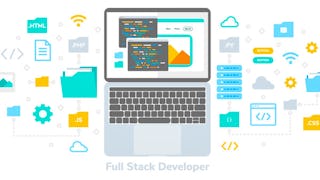![[Featured Image] A man sits at his laptop at home to research whether you need a degree to be a software engineer.](https://images.ctfassets.net/wp1lcwdav1p1/8xENeAlF6cGKiKOthV0qf/e09375d141d138a90a3d3e2ff547f505/GettyImages-1314769885.jpg?w=330&h=216&q=60&fit=fill&f=faces&fm=jpg&fl=progressive)
Do You Need a Degree to Be a Software Engineer?
Discover how to become a software engineer without a degree and which skills you need to start a successful career in the field.
January 28, 2025
Article
Learn more about the skills and certifications you need for a career as software or DevOps engineer, mainframe developer, QA tester, and more.

Explore popular software development courses

Skills you'll gain: Software Development Life Cycle, Software Architecture, Development Environment, Software Design, Software Engineering, Software Development Methodologies, Software Design Patterns, Systems Development, Software Development Tools, Program Development, Software Development, Integrated Development Environments, Application Security, Web Development, Cloud Development, Web Applications, Back-End Web Development, Computer Programming, Front-End Web Development, Python Programming
Beginner · Course · 1 - 3 Months

Skills you'll gain: Serverless Computing, Software Development Life Cycle, Node.JS, OpenShift, GitHub, Software Architecture, ChatGPT, React Redux, Web Development Tools, Microservices, Containerization, Responsive Web Design, React.js, Kubernetes, Cloud Computing Architecture, Object-Relational Mapping, CI/CD, Flask (Web Framework), Jupyter, Professional Networking
Build toward a degree
Beginner · Professional Certificate · 3 - 6 Months

University of Minnesota
Skills you'll gain: User Story, Agile Software Development, Software Development Methodologies, Scrum (Software Development), Design Thinking, Software Design Patterns, Agile Methodology, Software Architecture, Test Driven Development (TDD), Continuous Deployment, Kanban Principles, Software Quality Assurance, Continuous Integration, CI/CD, Version Control, Agile Project Management, Engineering Software, Software Engineering, Lean Manufacturing, Lean Methodologies
Intermediate · Specialization · 3 - 6 Months
Software development covers a wide variety of skills and careers, from programming to quality assurance to DevOps. With so many options and opportunities available, it can be tricky to know where to start. On Coursera, you'll find expert resources to support your goals, whether you're just starting out or are ready to take the next step in your career. Explore software development topics, including:
Interested in software development? Find out more about what a software developer does and popular software development courses.
Interested in DevOps? Read about the basics of DevOps, and explore certifications for DevOps engineers.
Interested in information technology? Learn more about IT and explore popular information technology certifications.
Ready to start learning? Explore our catalog of software development, DevOps, and IT courses for beginners and experienced professionals.
Software developers design specific computer systems and application software. Software engineers work on a larger scale to design, develop, and test entire computer systems and application software for a company or organization—software development is a subset of software engineering.
Many factors can affect individual earnings. According to the US Bureau of Labor Statistics (BLS)*, the median pay in the US for software developers, quality assurance analysts, and testers was $124,200 per year as of 2022.
*US Bureau of Labor Statistics. "Occupational Outlook Handbook: Software Developers, Quality Assurance Analysts, and Testers, www.bls.gov/ooh/computer-and-information-technology/software-developers.htm." Accessed January 26, 2024.
Here are a few things to consider when deciding which programming language to learn:
Current skill level. Some languages have a steeper learning curve than others. If you're brand new to programming, it's best to select a language that is beginner-friendly.
End goals. You may want to learn a programming language to accomplish a specific task, for example, creating a video game. Or, you might be interested in starting a career in programming. Either way, identifying your goals will help guide you in the right direction.
Popularity. Some programming languages are more widely used than others. Choosing a popular programming language can help you build in-demand skills and provide you with more resources and a larger community of programmers.